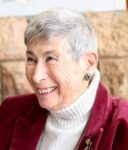The Magician by Colm Toibin; Penguin Books, London, 2021
By Dorothea Shefer-Vanson

MEVASSERET ZION, Israel — A few months ago, as I was reading (or rather ‘ploughing through’) Thomas Mann’s monumental Joseph and His Brothers (over 1,000 pages describing the worlds of ancient Mesopotamia and Egypt, ably translated from the German by John E. Woods), that brings to life the individuals who appear in the terse biblical account, someone kindly recommended that I read Colm Toibin’s fictionalized biography of the author.
This gave me a completely new view of the life and times of Mann, who started life in a provincial German town, lived through two world wars and moved from being a staunch supporter of the German nation and its culture to opposing the Nazi regime and being obliged to leave Germany in order to avoid harsh punishment.
Toibin has undertaken extensive research into Mann’s life and works while at the same time imaginatively recreating his conversations with members of his large family, as well as delving into the inner recesses of his mind and the way he drew on his experiences in the creative process of writing the books that made him famous.
In the late 19th century the family of the young Thomas Mann prospered in the Baltic port of Lübeck in northern Germany, where Thomas and his older brother, Heinrich, were subject to the rigorous discipline of provincial life and strict schoolmasters. After the premature death of their father the family firm was sold off and their mother and two sisters moved to Munich. Both Heinrich and Thomas had literary aspirations and, supported financially by their mother, dedicated themselves to writing, each of them gaining some initial success.
In 1905 Thomas married Katya Pringsheim, daughter of a prosperous and assimilated Jewish family living in Munich. Thomas and Katya had six children, three girls and three boys, who are described in the book as intellectually-lively and interesting characters, each of them with their own personality and spheres of interest. Thus, while Thomas and Katya sought to remain politically aloof, their two eldest offspring, Klaus and Erika, were political activists, as well as being involved in the dynamic cultural life and fluid sexual identity of 1920s Germany.
In 1924, with the publication of Buddenbrooks, the account of the decline of a once-prosperous family firm, very loosely based on the experience of his own family, Thomas Mann gained widespread fame, first in Germany and then in the English-speaking world when the book appeared in translation.
The sales of his books in Germany and abroad brought him financial success, and he was awarded the Nobel Prize for Literature in 1929.
The sobriquet ‘Magician’ was accorded to Thomas Mann by his wife and children because of the magic tricks and sleight of hand with which he used to entertain them. But beyond his role as pater familias, Thomas was a dedicated writer. Despite the demands of his young and growing family, he remained immured in his book-lined study for many hours, avoiding all contact with the rest of the family.
It was only at lunchtime that he emerged to preside over the meal, ensuring that the children were well-behaved and adhered to the strict code of table manners that prevailed in bourgeois European society at that time. His daily routine, which involved a rest after lunch followed by a walk with his wife and some time devoted to reading, enabled him to produce additional books over the years, including Death in Venice, The Magic Mountain, and Doctor Faustus, reflecting the psychological processes and cultural life of individuals and societies at the time.
Toibin’s book omits almost all reference to the enormous effort Mann put into writing Joseph and His Brothers, which is in fact four separate books and took him 16 years to write. Mann’s extensive knowledge of ancient Egypt and Mesopotamia involved delving deeply into the study of their mythology and culture, which he then reproduced imaginatively and with deep insight in the four volumes which constitute Joseph and His Brothers.
As a result of the rise to power of the Nazi party, Thomas Mann rejected his commitment to German society and left the country, moving first to Switzerland and then to the U.S.A. He settled eventually in Los Angeles but after 10 years there felt alienated from American society and moved to Switzerland, where he died aged 80 in 1955. In the last few years of his life, he visited Germany several times, but refused to return to live there.
Toibin has done a good job of bringing the stern German writer to life, setting him firmly in his time and culture as well as showing the reader how the process of writing a novel invokes both hidden and revealed aspects of the author’s life-experience, psychology, learning and native intelligence.
*
Dorothea Shefer-Vanson is an author and freelance writer based in the Jerusalem suburb of Mevasseret Zion, Israel.